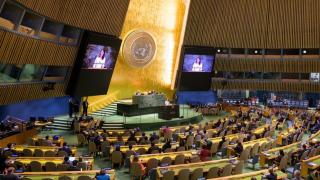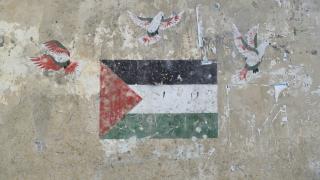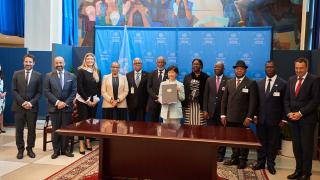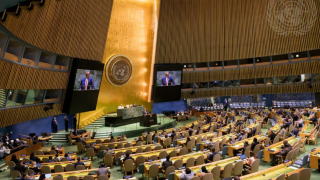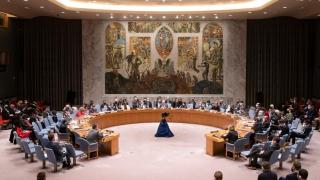
Part of our series of UN Briefings on topical UN issues
What is an Emergency Special Session?
For the first time in 40 years, on 27 Feb 2022 the Security Council has called for an Emergency Special Session (ESS) of the UN General Assembly - on the situation in Ukraine. The meeting will be at 3pm GMT today (28 February) and can be watched here.
The vote to refer the situation to the General Assembly could not be vetoed by Russia since it is deemed to be a procedural matter, meaning there is no veto power. The decision to take this route, named “Uniting for Peace”, comes after Russia vetoed a resolution put forward by America and Albania, co-sponsored by 82 states. The UK and 10 others voted in favour; China, India and the UAE abstained.
The “Uniting for Peace” mechanism stems from a 1950 General Assembly resolution (377(v)) that provides that “if the Security Council, because of lack of unanimity of the permanent members, fails to exercise its primary responsibility for the maintenance of international peace and security in any case where there appears to be a threat to the peace, breach of the peace, or act of aggression, the General Assembly shall consider the matter immediately with a view to making appropriate recommendations to Members for collective measures, including in the case of a breach of the peace or act of aggression the use of armed force when necessary, to maintain or restore international peace and security.”
Even if Russia had been able to muster the votes to stop the Security Council’s procedural decision to refer to issue to the General Assembly, the General Assembly would still have been able to call a ESS on its own authority, but the fact that the Security Council has requested it to meet gives the process additional credibility.
During the ESS, every state in the United Nations will have the opportunity to make speeches denouncing (or potentially supporting) the invasion, a process which can take as long as states see fit (suggestions are that this will last two days) following which states can vote on a resolution recommending various actions.
What sort of actions has the General Assembly taken in the past?
The General Assembly has called ten previous Emergency Special Sessions, which have taken a number of historical actions. The second ESS mandated the first UN Peacekeeping mission to go beyond simple ceasefire monitoring, and gave birth to the traditional form of UN Peacekeeping. The eighth ESS passed a number of incredibly strong recommendations against South Africa following its invasion of Namibia which called on states to sanction and isolate South Africa politically, militarily, financially and culturally and arm the Namibian resistance while a further measure asked the General Assembly to name and shame states that continued to do business with South Africa.
Other ESS’s have set up commissions of inquiry or called for humanitarian assistance. The most recent ESS, in 1997 on the situation in Palestine, was used to establish a rolling programme of meetings to discuss the situation which have been intermittently ongoing ever since.
What can the General Assembly hope to achieve?
One of the main things the General Assembly can do is demonstrate the weight of global opinion against Russia’s actions. A global condemnation of the invasion, outlining that it is in clear breach of international law and the UN Charter, will demonstrate the diplomatic costs of Russia’s actions and increase pressure for an end to the invasion. The resolution could also be used to invalidate President Putin’s justification for the war by stating there was no imminent danger to justify pre-emptive self defence (which is in any case a dubious justification) and that any military action to protect populations in Eastern Ukraine (even if such a threat were real which has not been demonstrated) would require a Security Council authorisation.
This is important because, beyond the immediate situation, President Putin’s actions should not be used to establish a new principle or “norm” that condones strong regional powers using force to control their “sphere of influence”. If the General Assembly overwhelmingly rejects this notion then it may dissuade other nations from taking similar actions in the future.
Beyond that, “Uniting for Peace” empowers the General Assembly to pass “recommendations for collective measures”. These are not “binding” resolutions such as the ones passed by the Security Council, but they carry greater symbolic weight than standard General Assembly Resolutions.
These recommendations can take almost any form. Possible routes which may be included in the context of Ukraine include:
- Establishing a Commission of Inquiry or International Independent Impartial Mechanism (IIIM) to document and preserve evidence of war crimes for later prosecution by the International Criminal Court (ICC)
- Recommending that states apply sanctions. This could increase the number of states that choose to do so, and increase the legitimacy of sanctions already applied by affirming their consistency with international law (the General Assembly and sanctions have a complicated relationship - strongly supportive in some cases and strongly opposed in others - a resolution could allay the fears of sceptics)
- Calling for an arms embargo on Russia, as a specific form of sanction, perhaps linked to a mechanism for naming and shaming states that supply arms to Russia
- Asking the UN Secretary General or other senior UN officials either to mediate between Ukraine and Russia or to campaign for increased assistance from member states with respect to humanitarian aid and refugees
- Asking the General Assembly to appoint an envoy, such as a former head of state or prominent former diplomat, to push for greater humanitarian support
- Calling on states to uphold their international obligations with respect to humanitarian aid and accepting refugees and those seeking protection
- Making specific condemnations, for example on Russia’s use of high explosives in built up areas, Russia’s aggressive nuclear posturing, on cyber attacks
Opinions differ on if the General Assembly can mandate the use of force or establish an international criminal tribunal. However, neither of these options appear relevant to the current context. The immediate objective of the international community is to push for peace and address humanitarian issues, not escalate matters. On the subject of justice, the International Criminal Court (ICC) already has jurisdiction to prosecute war crimes committed in Ukraine.
General Assembly resolutions that come out of the ESS will need the votes of 2/3rds of member states present and voting to pass. If all states were to vote then 129 votes would be needed but given a likely sizeable number of abstentions it would pass with fewer votes. However, as the primary purpose of the resolution is to reflect the unity of global opinion in opposition to the invasion, states may well choose to avoid some of the more contentious subjects in order to get maximum support.
How much of the international community is standing with Ukraine?
82 states cosponsored the resolution that Russia vetoed in the UN Security Council, and a number of other states can be expected to vote in favour even though they are not willing to go so far as to cosponsor (as Brazil, Gabon, Ghana, Kenya, and Mexico did at the Security Council). In contrast only a very small number of states with close political ties to Russia, like Nicaragua and Belarus, have voiced support for Russia’s actions.
Granted, many states are likely to abstain, as China, India and the United Arab Emirates did at the Security Council. Many countries, particularly in the global south, have a strong tradition of “non-alignment” where they looked to maintain equidistance between NATO and the Soviet Union and its successor state. They may be reluctant to be seen to side with one side or the other.
However, given the explicitness of Russia’s contravention of the basic principle of state sovereignty - a principle frequently championed by the 120 states that comprise the “Non-Aligned Movement” - those states will now be considering whether maintaining non-alignment is more important than maintaining consistent application of a principle they view as essential to their own security. Russia’s slide towards becoming a pariah state may make their decision easier by making non-alignment less appealing.
What is the UK’s position?
The UK is normally active in guarding the powers and roles assigned to the Security Council where it enjoys a privileged position as one of the five “permanent members” with veto power. However, in this instance the United Kingdom actively supports the referral to the General Assembly.
On adopting the Resolution for the General Assembly referral, the UK’s Ambassador to the UN, Barbara Woodward, said “Russia again was isolated in opposing this resolution. But Russia cannot stop the world from coming together to condemn its invasion of Ukraine…We urge all Members of the United Nations to use their voice tomorrow to call for the immediate withdrawal of Russian forces from Ukraine and an end to this war.”
Domestically the UK has committed to offering ongoing humanitarian assistance to Ukraine while imposing sanctions and supporting the removal of Russian banks from the SWIFT payment system. However, we call on the UK to clearly set out its intention to uphold its international obligations by offering to accept significant numbers of refugees and those seeking protection. In addition we would urge the UK to outline a strategy for discouraging Russia from committing atrocities such as the deliberate targeting of civilians, indiscriminate use of high explosives in built up areas and by outlining what further measures they would take in response to repeated such instances.
Read UNA-UK's Statement on Russia's invasion of Ukraine
Read about our recent summit on Ukraine with UN Associations from across the world
Image: Russia blocks Security Council action on Ukraine. Security Council votes on draft resolution on Ukraine, 25 February 2022. Credit: UN Photo/Mark Garten.

